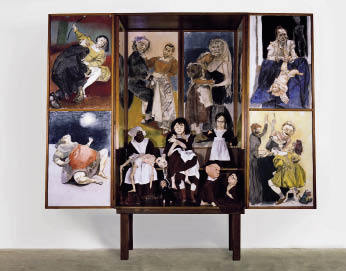Salome
Royal Opera House
Die Meistersinger
Welsh National Opera on tour, Birmingham
Richard Strauss’s Salome is no joke for its director, however much it may be for the audience. When David McVicar mounted it at the Royal Opera in 2008, the production, together with the cluttered designs of Es Devlin, seemed to have as its main object to keep the eye occupied while the mind wondered and probably wandered. Scenes reminiscent of Pasolini’s Salò, not a movie I was happy to be reminded of, and one that has no connection I can see with Strauss (stills from it continue to illustrate the programme), were enacted down below, while at the very top of the stage a lavish Edwardian dinner was in full guzzle, and the heroine rushed up and down a connecting staircase to no purpose. That has mostly gone, though the set and the dinner party remain.
Otherwise, it is a pretty routine production, except for the non-dance of the veils; and nudity is to be found not with Salome, who wears a white dress or shift throughout, but with the executioner of John the Baptist, who disrobes to carry out his task, and sits moodily through the last scene until, on Herod’s order ‘Kill that woman!’, he turns and rapes Salome to death. Jokanaan’s head remains in fairly good shape throughout its lengthy ordeal of being sucked and licked by Salome, but one way and another the executioner and the heroine manage to get soaked in red paint. It seems as if Justin Way, the revival director, has given up on the work, or at least on giving a distinctive slant to it, and that does seem a good idea, though anyone who wanted to take it seriously in some way might disagree.
The musical side of things is excellent, and one can concentrate mainly on that. Angela Denoke doesn’t have the voice of an Isolde or look to be 16, the composer’s characteristic demands: but she is lithe, tireless and produces enough of a stream of lovely tone to make the last quarter-hour most of what it should be. And she manages a contained ferocity of desire that builds up the tension of the preceding hour and a half very effectively. She is enormously helped by the conducting of Hartmut Haenchen, whose fleet and light touch in this repertoire pays off in making this seem, though it wasn’t, the shortest Salome I’ve ever heard. Only the immense eruption in the orchestra when the head is brought out of the cistern was lacking in its full revolting effectiveness; but the last dissonant scrunch of the orchestra was impressively noisy and sustained, and had the full measure of the piece.
Johan Reuter’s Jokanaan is ideal, very much as the obsessively observant Salome describes him, and he booms grandly, making one long to hear him as Siegfried’s Wanderer. Gerhard Siegel, overfed in his tuxedo, distributes his energies between lechery and distraughtness to a tee, and only the Herodias of Irina Mishura is crudely exaggerated. The Dance does remain an irritating blight, consisting as it does of rooms, some of them lavish, moving across the stage from left to right, while Salome runs, pursued by Herod, from right to left. As conspicuous consumption goes, this is the Royal Opera at its most flagrant, flaunting its capacity to spend on a few minutes what any other UK company would keep going on for as many months.
As, for instance, Welsh National Opera and its great production of Die Meistersinger, which I saw again in Birmingham, four performances later than my first visit to it in Cardiff. This is, oddly enough, the other opera in which John the Baptist plays a central role, though he is not, of course, one of the characters, merely the crucial metaphor in Wagner’s brilliantly intricate, witty and profound libretto. Marvellous as the Cardiff performance was, this was considerably better.
Bryn Terfel clearly now trusts himself to sing the role of Sachs, vocally the most demanding in Wagner, without stinting, and the result is a revelation. No other Sachs I have heard has dared to sing with such authority in Act I, yet by being so imposing at such an early stage, Terfel made clear Sachs’s position, and gave a different shape thereby to the whole unfolding drama. In Cardiff, Terfel seemed to present the role imposingly, here he lived it, to an unforgettable degree. Anyone who loves this opera will have emerged transformed — and exhausted — by its unflagging inspiration, the warmth with which Sachs, thanks to his creator, manages to view the direness of the human condition and to remain so radiant a personality. Fortunately, Christopher Purves, as consummate an artist as Terfel, managed to build his portrayal of Beckmesser as the precise antipode of Sachs, so that the balance of the work was perfectly sustained. This great account of Die Meistersinger must be preserved, if only to show that even in 2010 it was still sometimes possible to do Wagner justice.






Comments